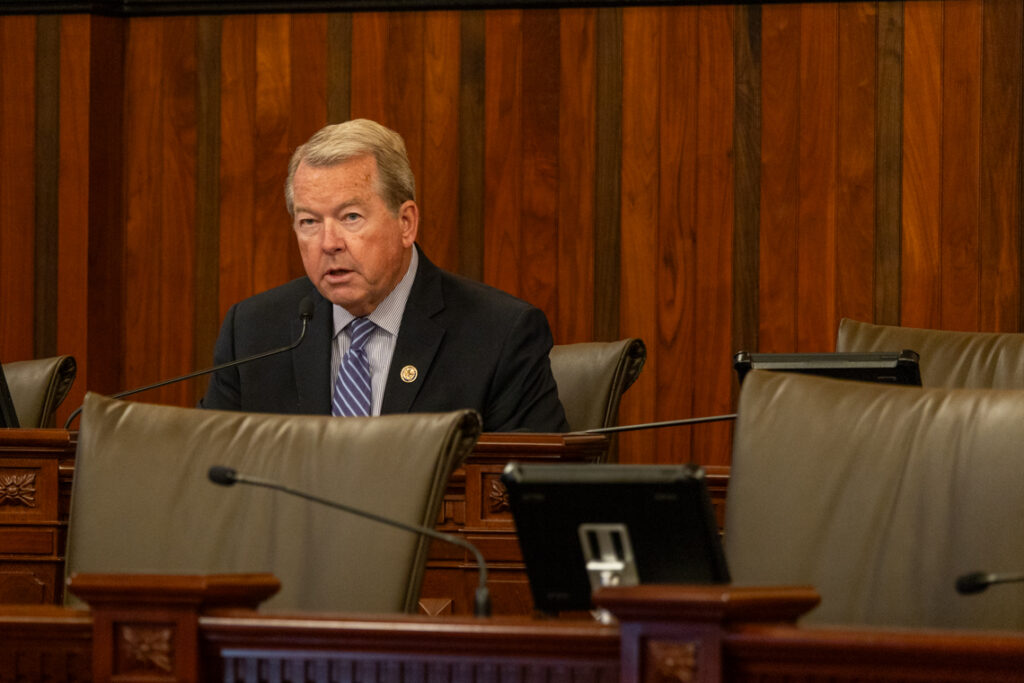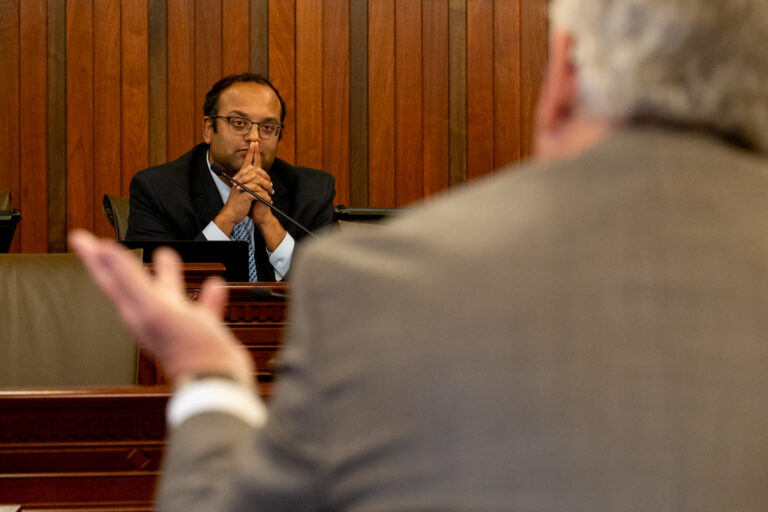Many details still needed before lawmakers can put forward transit funding proposal
SPRINGFIELD – Public transit agencies in downstate Illinois are joining Chicagoland rail and bus operators in asking the state for help balancing their budgets.
A state committee met with leaders from a half dozen downstate agencies on Tuesday – the sixth and final scheduled hearing on the subject since lawmakers began a series of workshops on transit in July.
The Senate Transportation Committee hearings were meant to host conversations about public transit as lawmakers and advocates work on proposals that could yield sweeping reform to how public transit is financed and governed.
Funding for public transportation has become a top priority for some lawmakers over the past two years as transit agencies in Chicagoland have sounded alarm bells on a looming financial crisis.
The Regional Transportation Authority, which oversees the Chicago Transit Authority, Metra commuter rail service and Pace suburban buses, forecasts a $730 million gap in its 2026 budget – roughly 20% of RTA’s annual operating costs. That gap could widen to more than $1 billion by 2030.
But transit systems serving riders outside of the Chicago area said Tuesday they could also use the state’s help in balancing their finances.
“We are approaching a similar fiscal cliff to the northeast region,” Karl Gnadt, managing director of the Champaign-Urbana Mass Transit District, said.
Gnadt said CUMTD is expanding to a point where the state may not be able to cover necessary costs.
The state funds up to 65% of downstate transit agencies’ yearly costs through the “Downstate Operating Assistance Program,” but transit agency heads say the program is underfunded and can’t keep up with planned expansions.
David Braun, the managing director of the transit system in Bloomington-Normal, said that without that support, his agency could be forced into a “contraction era.”
“People that have become dependent on us have chosen where to live based on the service we provide and if we start pulling back service, if we have to contract – and all of us will have to contract to be below what the downstate operating fund can provide – then that will suppress the growth of our communities, it will suppress residential building, it just becomes a chilling effect all through downstate,” Braun said.
The head of the Rock Island County Mass Transit District – more commonly known as Quad Cities MetroLINK – said state funding might fall short by as early as 2026.
These downstate systems are much smaller than the systems that make up the RTA. But they often serve vulnerable populations who have no other means of transportation.
“A large majority of our riders don’t use public transportation out of convenience. They use it out of necessity,” Sara Nollman-Hodge, managing director of the South Central Illinois Mass Transit District, said.
Slow pandemic recovery
The pandemic was a frequent theme on Tuesday – and in previous transportation committee hearings. While many sectors of the economy have bounced back from the worst of the pandemic’s effects, public transportation agencies across Illinois are still fighting to recover.
Ridership – a key statistic for public transit agencies – remains below pre-pandemic levels for most transit agencies in Illinois. The CTA provided 20 million passenger trips in the first eight months of 2024, about two-thirds of what it provided in the first eight months of 2019, according to data from the U.S. Department of Transportation.
Downstate agencies face similar shortfalls. Using the same comparison, Champaign-Urbana Mass Transit has reached 87% of its pre-pandemic levels. Rock Island reached 67%. Rockford reached 80%.
For the 18 Illinois transit agencies that report ridership data to the federal government, 2024 saw about 64% of the trips taken in the same period in 2019.
But the heads of some of these agencies painted a more nuanced – and sometimes rosier – picture for lawmakers on Tuesday.
Gnadt, speaking about Champaign-Urbana, said certain segments of their riding population are back to pre-pandemic levels. Champaign students, who take public transit to get to school, have recovered and riders associated with the University of Illinois Urbana-Champaign are nearing a full recovery, but his agency is still facing issues stemming from an “employee shortage.”
Other agency heads noted that they are nearing pre-pandemic ridership levels. But the slowdown of passenger traffic means less revenue for agencies to work with, adding to funding challenges.
Some agencies also struggle with implementing requirements from the state to offer free fares to some residents, according to Nelson.
Calls for reform
The problems facing public transit in Illinois – and in particular the problems facing the Chicagoland region – have animated bipartisan calls for state action.
“Do I believe the state has a larger responsibility in funding mass transit? Absolutely,” Sen. Don DeWitte, R-St. Charles, said Tuesday. “I think the state has to make mass transit across the state, not just the metropolitan area, a priority.”

But the next steps in how to fund transit systems are still up in the air. Senate Transportation Committee Chair Sen. Ram Villivalam, D-Chicago, repeated a line he’s used throughout this year again on Tuesday: “no funding without reform.”
Late last year, proposals from the state-backed Chicago Metropolitan Agency for Planning and the private, nonpartisan Civic Club of Chicago both outlined sweeping reforms that would see Chicago-area transit agencies combined into a new entity or giving new authority and oversight powers to the RTA.
The most drastic of these reforms have been met with pushback from some influential interest groups. Illinois AFL-CIO President Tim Drea noted on Tuesday his organization opposed consolidating the RTA agencies.
“We’re looking at everything right now and trying to figure out what, in our opinion, will be the best type of governance,” Drea said.
DeWitte, meanwhile, hinted at backing an “empowered” RTA over a total restructuring of northeastern transit agencies.
Beyond the ongoing negotiations surrounding the RTA, Villivalam also noted that he and others on the transportation committee need more details about the transit problems facing Illinois.
“We certainly need to understand governance and the funding models for downstate and central Illinois better,” Villivalam said. “We need to understand the opportunities for interconnectivity as well.
Lawmakers are scheduled to return to Springfield in November for a brief fall veto session, but passage of transit reform is unlikely to happen before the spring legislative session begins in January.
House Speaker Emanuel “Chris” Welch, D-Hillside, said as much to the City Club of Chicago last month.
“Oh gosh definitely not in veto session,” Welch said when asked about a timeline for transit reform. “This is probably an end-of-May issue.”

